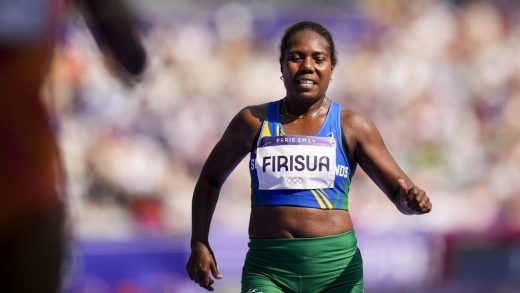Winnipeg roots-rockers have melded their sound through decades of highly charged sessions

Practice makes perfect. Even when you’re the Fuse, a legendary, Winnipeg roots-rock band whose core members have been playing together under one banner or another since 1975.
For years, brothers Jeff, Paul and Don Hatcher, along with honorary sibling David Briggs, have been writing, recording and rehearsing at Paul’s Crescentwood abode, affectionately dubbed “the Palace,” on a near-weekly basis. Never mind the group, which counts Laurie Mackenzie on guitar and John Neal on bass, only performs live once or twice a year, nowadays; the highly charged, multi-hour sessions have become as much a part of their common routine as a trek to the bank or grocery store.
“No doubt about it, if more than two weeks go by without everybody coming over to jam, it definitely feels like there’s something missing,” says Paul, a retired mail carrier and the band’s drummer.
“I’m the same way,” pipes in Briggs, a retired school teacher who handles guitar, piano, organ and vocals. “It’s not like I can’t write and play at home on my own, because I do all the time. It’s just that my life in general comes back into a more pleasing focus, when we’re getting together regularly.”
Essential Fuse
For local musicologist Stu Reid, the Fuse isn’t just the best band to emerge from Winnipeg, all-time, it’s the best rock band to hail from the Great White North, period.
The longtime host of CKUW 95.9 FM program TwangTrust jumped at the opportunity to list what he feels are the group’s 10 best songs. Plus, he has trouble counting to 10.
For local musicologist Stu Reid, the Fuse isn’t just the best band to emerge from Winnipeg, all-time, it’s the best rock band to hail from the Great White North, period.
The longtime host of CKUW 95.9 FM program TwangTrust jumped at the opportunity to list what he feels are the group’s 10 best songs. Plus, he has trouble counting to 10.
(Listed chronologically; all accompanying comments by Reid)
Sad Eyes — The Fuse (Writing on the Wall EP, 1979) It’s new wave, kids! The best indie 7-inch to ever come out of Winnipeg recently sold on Discogs for $438.75. It was a bargain.
The Kids Can’t Go Home — The Fuse (Unreleased demo, 1979) A few months after the EP came out, a tape of this intense, driving rocker received considerable airplay on CJUM-FM101. It’s the Fuse version 1’s best track and they never played it after 1979. That is until the band’s friend, Paul Cantin, hired them for his wedding social in 1996 under the stipulation they perform it that night. Hasn’t been heard since.
Your Lies — The Six (The Six, 1981) This piano-fuelled dance-floor smash is my favourite song on an album exclusively full of five-star classics. Records don’t get better than the Six’s album.
No Question — Jeffrey Hatcher (Unreleased demo, 1984) A haunting solo recording Jeff made in Toronto, pre-Big Beat. The band played it occasionally in the late ’80s but it’s since been retired.
Deliver Me — Jeffrey Hatcher & the Big Beat (33 & 1/3 EP, 1986) Probably their most enduring song, having been covered by the Cowsills and Big Dave McLean, plus the definitive version by the Blue Shadows in 1993.
Out of Time — Jeffrey Hatcher & the Big Beat (Cross Our Hearts, 1987) Dating back to the days of the Six, this would’ve been your favourite song on Beatles For Sale, had it been on there.
The Last Ones — Hatcher-Briggs (Getting There From Here, 2010) Another one from the Six era, this instrumental has been in the set ever since, including with the Blue Shadows. So iconic, it’s been the theme song to my CKUW radio show, TwangTrust, for 25 years.
Brilliant Sun II — The Fuse (Brilliant Sun, 2015) As great as all those early songs are, there were always technical production issues with the recordings. It’s crazy to think this was made by the same bunch of guys in their basement. (Producer) Don Hatcher is a wizard. This song positively soars in every conceivable way.
Think It’s Alright — The Fuse (Brilliant Sun, 2015) A glorious, wayback machine trip to Laurel Canyon in the ’60s, from modern day Crescentwood.
Thorns in Your Crown — The Fuse (At the Palace, 2024) I was mighty excited when I heard they were resurrecting this gem. I’ve loved this song for decades via the cassette bootleg I made of the Six at the Royal Albert in 1983. The original country arrangement has been replaced with a classical guitar/organ motif that hints at the Left Banke.
Against the Dying Light — The Fuse (At the Palace, 2024) How many bands — heck, how many artists in any medium — create their best work late in life? Not many. For me, this joyous baroque-pop masterpiece is the greatest song they’ve ever done.
This Saturday, March 2, the group’s loyal fans get their latest opportunity to join in on the fun, when the Fuse appears at the Park Theatre. The anticipated three-hour concert, which will also feature guest vocalist Wendy Bird, will serve two purposes: as a fundraiser for Habitat Manitoba, and as a release party for At the Palace, the band’s new, self-produced 20-track CD.
The disc is a mix of songs that came together while they were rehearsing for Saturday’s show, and ones that go back as many as four decades that they never got around to recording, says Don, a Canada Post employee who is responsible for guitar, pedal steel, keyboards and vocals.
“To me, you have to remain creative your whole life,” he says, strapping on his six-string. “I’m thankful we still have the band to allow us to cater to that side, whether we’re in front of an audience or not.”
David Briggs and Jeff Hatcher, the eldest of the three brothers, have been friends since 1968, when the two were Grade 5 classmates at Queenston School. They discovered they had the same taste in music, and very quickly, they taught themselves to play guitar, by mimicking what they were hearing on records by the likes of the Beatles, the Rolling Stones and Chuck Berry.
Paul, two years their junior, guesses he was 14 when he started sitting in on drums.
For over a year, the three of them played together at Jeff and Paul’s house on Dorchester Avenue four nights a week, Monday through Thursday. As much as they were learning songs, they were also learning their instruments, until it reached the point where they thought it might be beneficial to try playing in front of other people, for a change.
Briggs laughs, noting they were so green ahead of their debut performance at River Heights Junior High that they didn’t even have a band name. A pal of theirs had designed a poster to promote the dance, listing them as “the Boys,” so that’s what they went with, he says.
Jeff, a music therapist, credits another buddy, former Winnipeg disc jockey Steve Warden, for rechristening them. Bands with “the” names like the Knack, the Cars and the Clash were all the rage, and Warden suggested they dub themselves the Fuse, after a Jackson Browne song called just that.
By 1978, the Fuse was one of the most popular draws in the city, so much so the new-wave sounding troupe wound up on the radar of a future Rock and Roll Hall of Fame member. Although thousands claim to have been at the St. Vital Hotel the November night Elvis Costello joined the Fuse on stage, following his sold-out concert at Pantages Playhouse Theatre, in reality, there were 200 people in the crowd, tops, Briggs recalls.
The guys welcomed another famous face three years later when, as the Six, they were booked for a sold-out week of dates at Broadways, a club located in the basement of the Hotel Fort Garry. British rockers the Police were in town that same week, and the night before a show of their own at the Winnipeg Arena, the group’s leader made a point of checking out the Six, which now counted Don in the fold.
They were standing in the kitchen area between sets when Sting’s bodyguard poked his head inside, saying his boss wanted to meet them. “I remember him saying he really liked our song My Elizabeth,” Paul recounts. “He was also curious about how long we played. Back then, we were doing four, 45-minute sets, per night, and he was like, ‘oh my, that’s a lot of work.’”
In 1986, two years after the dissolution of the Six, the guys resurfaced as Jeffrey Hatcher and the Big Beat. Their debut album, Cross Our Hearts, drew rave reviews in Rolling Stone magazine (“infectious, upbeat and deeply felt”) and the Globe and Mail (“classic rock and roll”). That led to opening dates for the likes of Steve Earle and John Hiatt. (In 1988, a then-little known band, the Tragically Hip, warmed up for the Big Beat at Toronto’s Horseshoe Tavern.)
In a 2005 interview, Hugh Swandel, the group’s longtime manager, said, “I firmly believe that if there had been an internet back then, the Big Beat would have broke.” In the same interview, he blamed the Big Beat’s demise on their record company Upside Records folding shortly after the release of Cross Our Hearts. “It’s hard when… for 10 years, everybody’s always telling you you’re going to make it. Then, when you finally get close, the rug gets pulled out.”
Briggs tells a funny story about Hatcher-Briggs, the group he, Paul and Don hatched in the 1990s, a couple years after Jeff moved to Vancouver to form alt-country band the Blue Shadows with American singer Billy Cowsill.
Hatcher-Briggs was booked at the downtown Pyramid Cabaret. On their way into the Fort Street club, they spotted a placard advertising the show, only the corresponding photo looked nothing like them.
“It turned out there was another Hatcher-Briggs band in the southern U.S., Alabama, I think, and the promoter, not knowing who we were, threw up their picture, instead of ours,” he says, explaining that was one of the reasons they reverted back to the Fuse, about 10 years ago.
As ever, Saturday’s setlist will touch on every phase of the guys’ 49-year odyssey, including a cover of Little Richard’s Slippin’ and Slidin’, one of the first songs they mastered, and Writing on the Wall, one of the first tunes they wrote and recorded.
“We’ll also be playing parts of the new record, keeping in mind that it’s a party atmosphere and people are there to dance, so we might park some of the slower (songs),” Paul says.
“There are also a few songs people would probably like to hear that Jeff would rather not do, simply because he doesn’t identify with the lyrics the way he did when he wrote them at the age of 22 or 23,” Don adds, mentioning Saturday will mark the first time his two adult children hear him play saxophone on stage. “We respect that, plus we have enough songs regardless. Heck, if we did everything from our catalogue, we’d be up there for days.”
About that; everybody chuckles when quizzed about the 8:30 p.m. start-time, which is markedly different from the “old days,” when they rarely kicked it into gear before 11 p.m., before proceeding to play into the wee hours of the morning.
“Well, there is a noise curfew at the Park, so we have to be done by midnight, whether we like it or not,” Briggs says.
“That’s true,” Paul interjects, “but honestly, at this point in our lives, we’d happily go on at four in the afternoon, right after David’s nap, and be home in time for supper. Real rock ’n’ rolly, right?”
Credit: Winnipeg roots-rockers have melded their sound through decades of highly charged sessions


